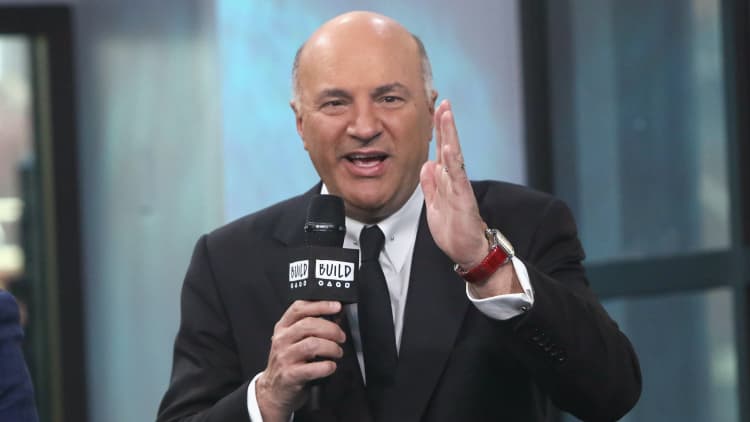Sometimes the stars of ABC's "Shark Tank" disagree on what makes a great entrepreneur.
On Sunday's episode, Shark Barbara Corcoran turned down a founder because she was still being financially supported by her father, while Mark Cuban and Daymond John told Corcoran her thinking was wrong.
Standing before the judges was Melissa Bartow, who pitched her vegan date spread company Wanna Date?. Bartow said she worked on the business full time, and that it had brought in about $31,000 in sales in 2019 up to that point.
But when she revealed how she stayed afloat, Corcoran was not impressed.
"Originally I'm from northwest Georgia, a town called Kennesaw. I just graduated from NYU," Bartow told the Sharks. "My dad supports me still."
To that, Corcoran responded, "Here's where, for me, it falls apart."
"When I was starting my business, if I didn't make a deal within two weeks, I was dead," she said. "I needed to live somewhere and eat.
"What is in your way, I believe, is that your father is helping you, because succeeding is an option, versus a necessity. I found that the people that really succeed have a real necessity — they have to do it, or the sky is going to fall in. With the absence of that, I can't believe enough to put my money in, so I'm out."
"Take away the security blanket of having your rent paid, and the comparison would be night and day in what you can accomplish. I've seen it over and over again with so many people," Corcoran said.
Corcoran herself has said she worked 22 different jobs before taking a $1,000 loan from her boyfriend to start her own real estate firm in Manhattan in 1973. She sold The Corcoran Group for $66 million in 2001.
But Bartow objected, telling Corcoran she was "never handed anything."
"I won't be homeless if this fails, but I do everything on my own. My dad believes in me. I am not a rich kid. I don't sleep. I carry cases all over New York. I work events, I do them all myself. Nobody helps me," Bartow said. "Failure is when you quit. I don't quit, so this won't fail, because I will go until it succeeds."
John also disagreed with Corcoran's reasoning.
"Listen, I started out, and my mother mortgaged the house. And without her mortgaging the home, I couldn't have financed my first couple of shirts. So, that's Barbara's opinion," John said.
John launched apparel line Fubu with only $40 in 1992 and applied for bank loans to finance his company. He was rejected 27 times, and his mother took out an equity line on their house in Queens, New York, giving him $100,000 to purchase equipment. According to John, Fubu grew into a billion-dollar brand.
Cuban wasn't buying Corcoran's theory either.
"You know what Melissa, I don't agree," Cuban said. "I understand from an investment perspective, there is value when someone's back is against the wall. We've all faced it. But that's like saying, if Barbara's right, that means none of our kids could ever do anything on their own, and I refuse to believe that."
Cuban has said he slept on the floor of a $600-a-month, three-bedroom apartment with five roommates in his 20s before selling his first business, software seller MicroSolutions, to CompuServe for $6 million in 1990. He later co-founded Broadcast.com, which sold to Yahoo for $5.7 billion in stock in 1999.
In fact, Cuban was interested in investing in Bartow's company: "I just went vegetarian, so I'm always looking for things that are healthy, healthy for my family. The idea of a date-spread is great."
With a few contingencies, including changing packaging and adjusting the line of flavors, Cuban offered Bartow $100,000 for 33% of the company, and Bartow accepted.
After the deal, Corcoran told the Sharks she insulted Bartow to determine whether she would have a strong response.
"Did you notice after I insulted her, she was a different person?" Corcoran said, referring to Bartow's passionate response. "I wanted to see if she had what it took."
To that, John said, "after you insult anyone, they're a different person, Barbara."
"I think Mark brought up a point," he continued. Does that mean "none of our kids will be successful?" he asked.
"There are a lot of wealthy kids who become extremely successful," Corcoran said, "and I expect that from my children. But until I insulted her, I wasn't feeling her vibe. She came back like a fire, that's what I wanted to see!"
Previously, Cuban has praised Corcoran's knack for reading entrepreneurs in the Tank.
"Barbara's got the best people skills," he said told Corcoran on her "888-Barbara" podcast in November. "Her ability to recognize the good and bad in somebody and what they'll be like as an entrepreneur, what they'll be like as a person. Barbara picks up on that stuff in a minute."
Like this story? Subscribe to CNBC Make It on YouTube!
See also:

Disclosure: CNBC owns the exclusive off-network cable rights to "Shark Tank."


